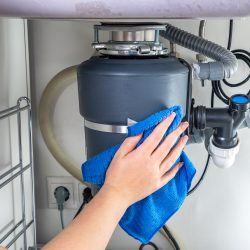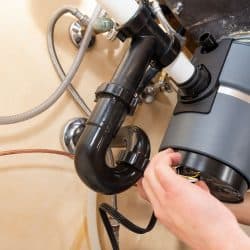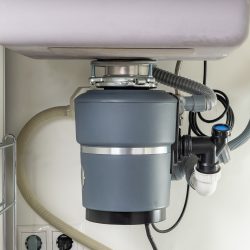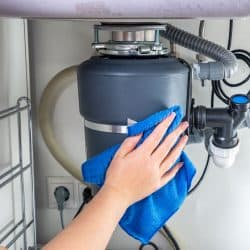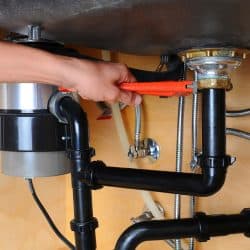The dishwasher is a lifesaver for someone who hates doing the dishes the old-fashioned way. But having issues with the sink when your dishwasher runs is never fun. If your sink backs up when your dishwasher runs, and you need a solution to the problem, look no further. We have done the legwork for you.
To prevent the sink from backing up when you run your dishwasher, you should check the locations where clogs typically occur. Any jams in the dishwasher, garbage disposal, sink, or air gaps can cause water to overflow in your sink. You should get rid of the clogs to solve the problem.
A sink backing up while the dishwasher is running is a common household problem. Simple plumbing repairs can usually fix this issue. In this post, we’ll discuss how to drain each area and how to maintain the sink and dishwasher as well. Continue reading for more information on this concern.
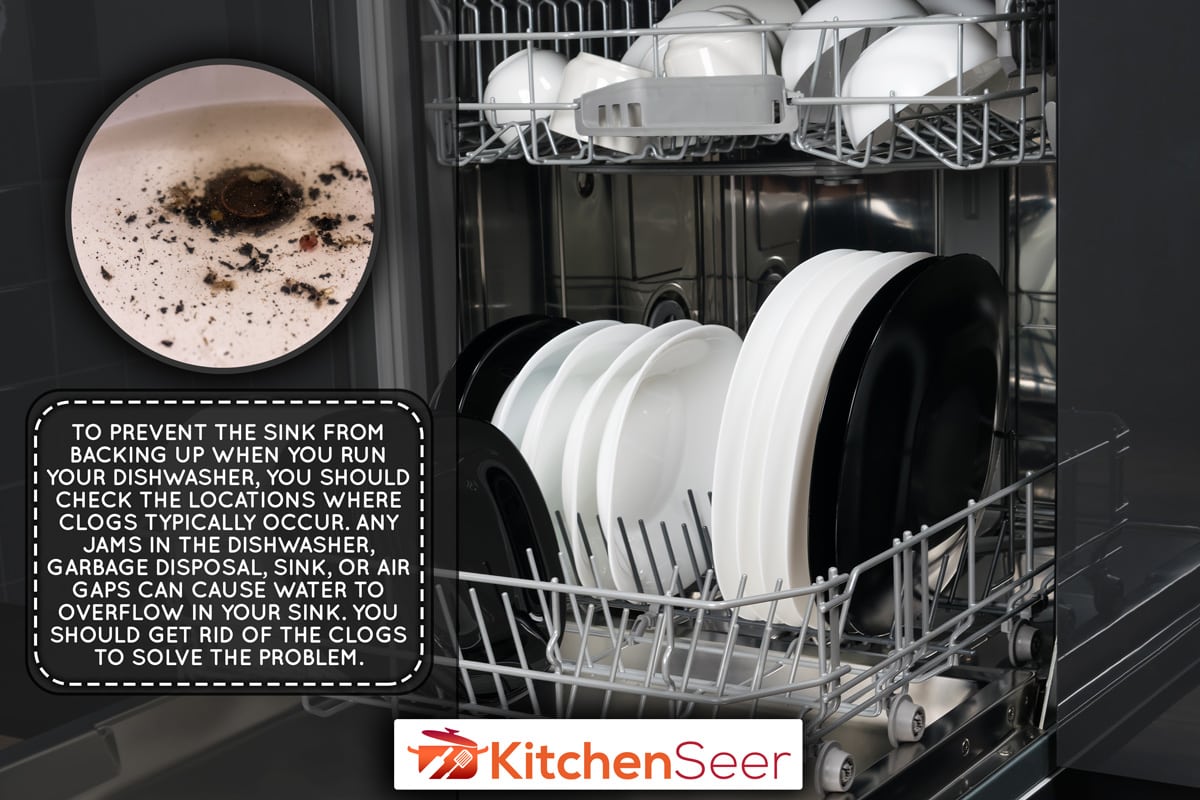
Common Reasons Why Sink Backs Up When Running Dishwasher
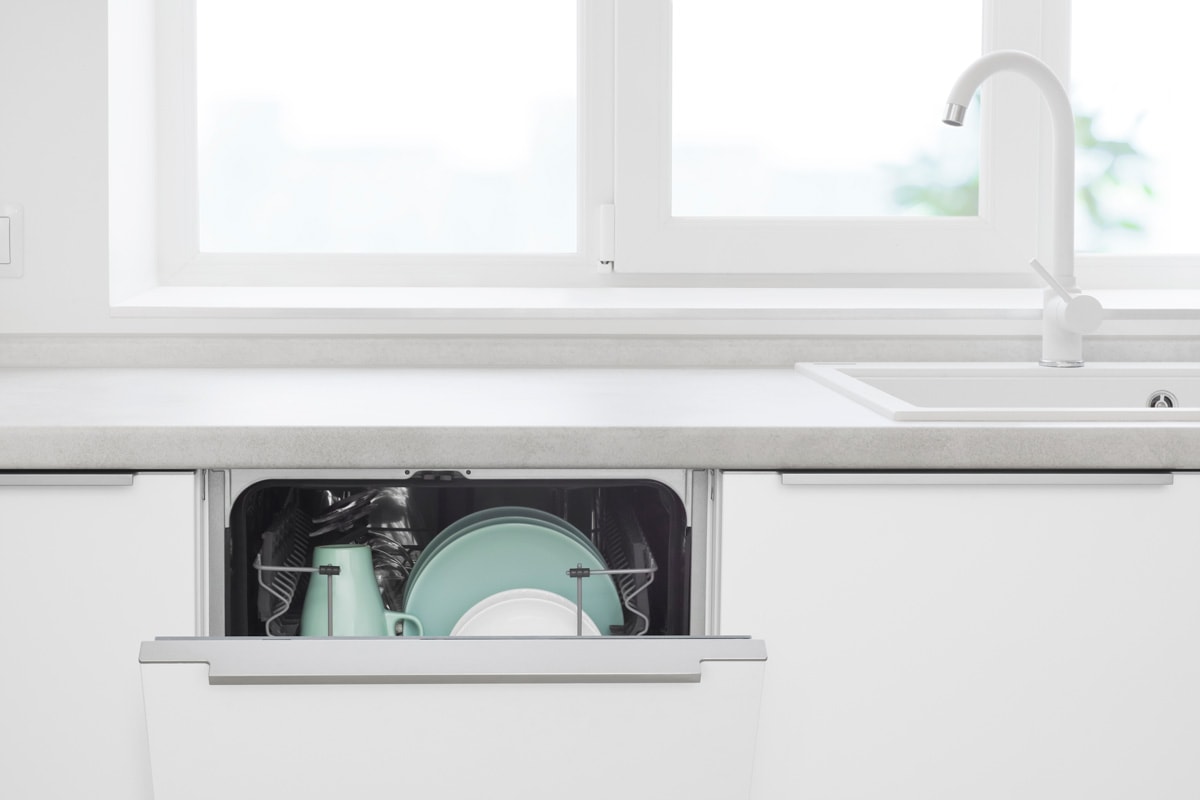
Your sink and dishwasher use the same drainage line, so any blockage in the line will cause the water to overflow into the sink.
Obstructions in the garbage disposal, sink, air gaps, or the dishwasher itself will cause the water to back up when you use the dishwasher.
The Garbage Disposal Issue
One problem could be the garbage disposal knockout plug. Make sure that you remove the plug before installing a newly purchased garbage disposal.
If you don’t remove this plug before installation, you will have to uninstall the garbage disposal. The knockout plug should remain if you have no garbage disposal to connect.
To remove the plug, turn the garbage disposal to the side. Use a hammer and screwdriver to lightly nudge it. Carefully pull it out with a pair of pliers. The clogging issue should be solved once you remove the plug.
If your garbage disposal isn’t new, there may be waste buildup in the small connection, so the easiest fix is to remove it and have it cleaned.
Clogged Sink
You have checked your garbage disposal and found no problems with it. Next, move on to the sink. It is common for the sink to clog from time to time. There are a lot of ways to unclog your sink.
The first option is to pour boiling water into the drain, then flush it after five minutes.
Next, you can pour a one-to-one ratio of vinegar and baking soda into the sink. Pour the baking soda into the drain, making sure that there is no water in the sink, and then pour in the vinegar. Seal the drain. Leave it for at least 15 minutes and then pour hot water down the drain.
A drain snake can also be used to unclog a sink. This tool is used to dislodge debris and pull it out of the drain.
Click here to see this drain snake on Amazon.
There are also products you can pour into the drain to help dissolve the debris.
Click here to see this drain clog remover on Amazon.
Blocked Air Gap
The dishwasher air gap is located on top of the sink beside the faucet. Its purpose is to prevent wastewater from seeping through the clean water. If this is blocked, water will be gushing out of it.
To clear it up, you have to remove the top cover of the air gap. Next, press the insert on both sides to release the protective cap. Once you have removed this, you’ll see what’s blocking the air gap.
Obstruction In the Dishwasher
Debris can easily get stuck in your dishwasher drain. You should clean the dishwasher on a regular basis to prevent these obstructions. A clear indicator that the dishwasher is clogged is the buildup of water at the bottom.
If you’ve cleaned the drain, and nothing is working, the problem could be the filter. Since not all dishwasher models are the same, check your user manual to see where the filter is.
The issue of water backing up in the sink when the dishwasher is running should be solved once you check for blockages in these four locations on your plumbing system.
How To Prevent Sink From Clogging and Keep It Clean
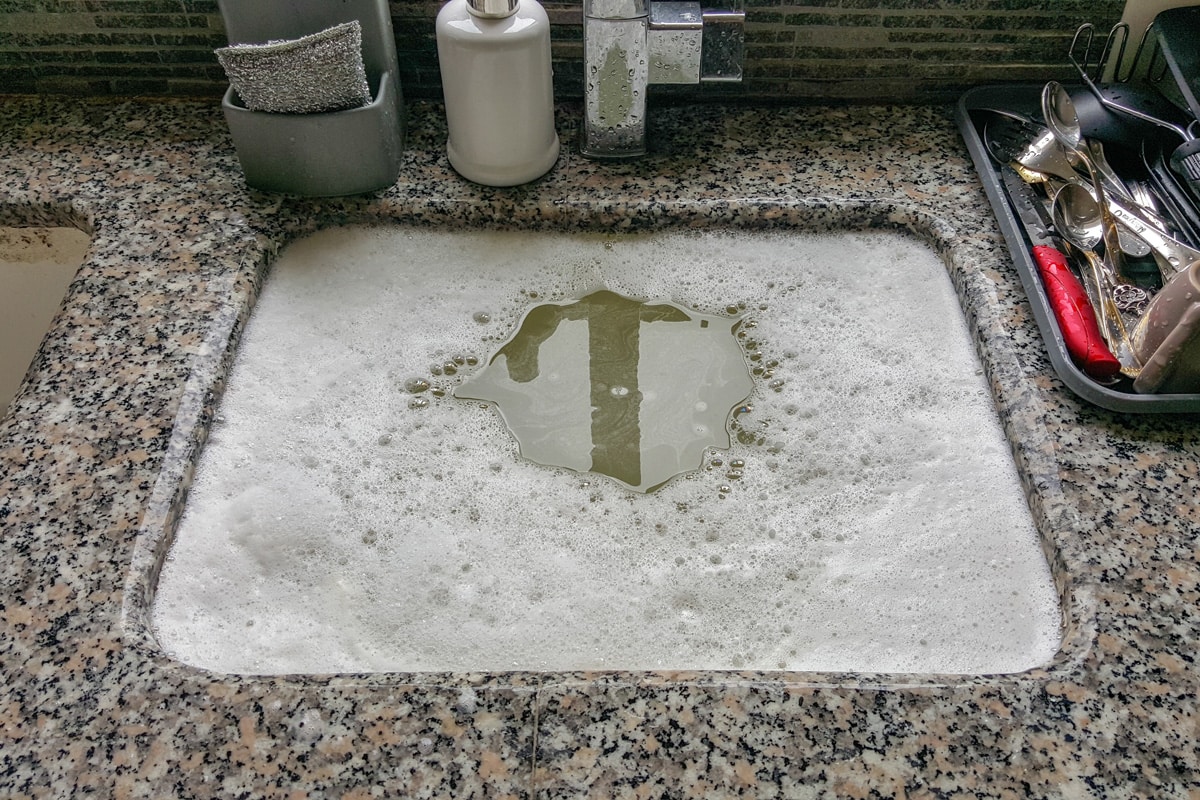
The sink will not take care of itself. It is up to you to keep it free from particles that shouldn’t go down there. You should maintain the cleanliness of your sink because you also use it in washing raw food and produce.
- Do not rely too much on the garbage disposal by throwing all food scraps, peels, and other things into the drain. Over time, these will build up and clog the drain so these should go to the trash.
- Another thing to keep in mind is grease. If you throw leftover oil down the drain, this can cause the drain to jam.
- Put strainers over the sink opening. This catches items that may block the drain.
- Keep the sink dry. Moisture is bacteria’s friend. After you use the sink, make sure to wipe it dry.
- When cleaning, you should use disinfectants that are not too harsh. You can also create a solution of one part vinegar and one part water to clean grime and keep germs away. Lemon juice and baking soda are also good as a disinfectant and deodorizer for the sink.
Click here to see this disinfectant on Amazon.
Can You Use The Sink While The Dishwasher Is Running?
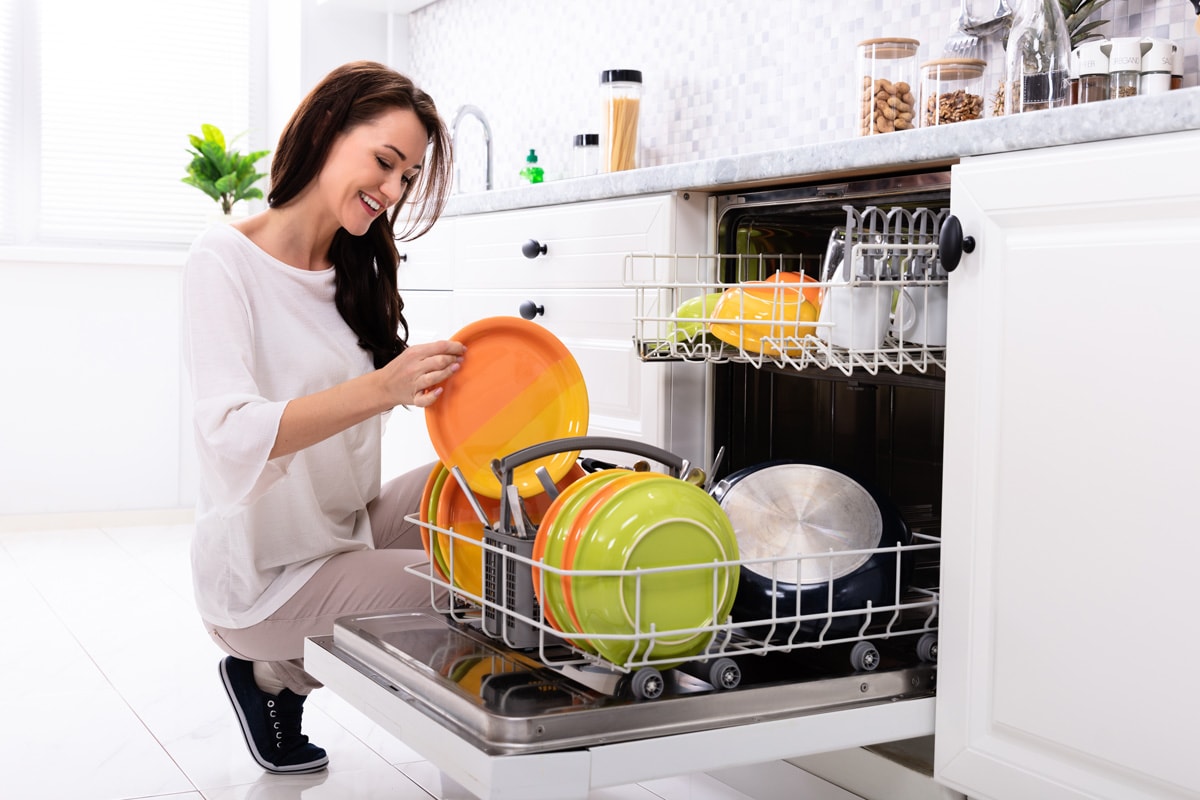
There are times when you need to multitask. In these instances, you may wonder if it is safe to use the sink and the dishwasher at the same time. You can use the sink while the dishwasher is running but not without conditions.
We mentioned earlier that both sink and dishwasher share the same drainage line. Consequently, the drain should be in perfect condition if you decide to use the sink while the dishwasher is running.
Another thing to consider is the pressure of the water. If the pressure is not strong enough, it’ll be difficult to use both the sink and the dishwasher at the same time.
What Is The Average Lifespan Of A Dishwasher?
A dishwasher works several times a day so you may wonder how long it can endure the hard labor. Generally, dishwashers last up to 10 years with proper care.
How Do You Know When You Need A New Dishwasher?
Typically, you think of quality when buying a new appliance so you don’t have to worry about replacing it in the next five years. However, over time, even a quality item gets damaged. In this case, of course, a repair is the answer.
Still, there are instances when repairs aren’t enough. With dishwashers, if the cost of repair is more than half of its price when you bought it, replacement is better.
Moreover, if your dishwasher can't be cleaned, or spots can't be removed, no matter what you do, then you should let it go.
Why Does Your Dishwasher Smell Bad?
This occurrence is common among appliances that are not cleaned properly. In the case of dishwashers, the bad smell comes from remnants of food and grease buildup.
The bad smell coming from your dishwasher is not permanent. An easy fix is to change the detergent you use. The one you have may not be strong enough to get rid of bits and pieces of food, as well as bad odors.
Click here to see this detergent on Amazon.
What Are The Most Common Problems With Dishwashers?
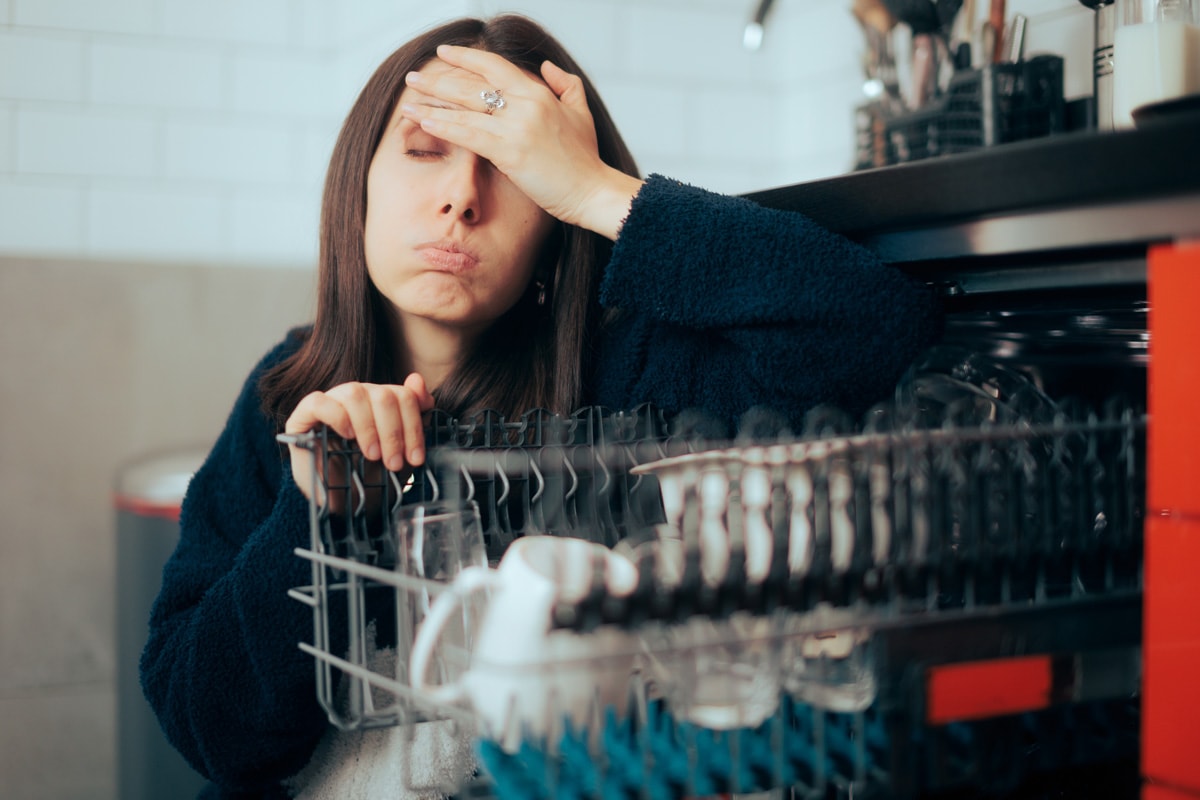
One of the most common issues with dishwashers, apart from having a conflict with sinks, is that the dishes are not drying.
After a full cycle, you should be able to put dry dishes away. However, there are times when the drying function fails. The happens when the rinse aid dispenser is empty. The rinse aid dispenser helps dishes dry in the dishwasher.
Some dishwashers can leave white residue or spots on glassware. This is a result of hard water.
Hard water has high levels of magnesium and calcium, and it can stain glassware. The residues can be removed with your trusty vinegar solution. Add the solution to the dishwasher and run it normally.
These are just common problems with dishwashers. You may run into more issues if you are not careful in operating and maintaining your dishwasher.
Summing Up
When your sink backs up while the dishwasher is running, it's usually because of a clog. Four locations can be clogged and should be checked to resolve the issue.
Removing the blockages in these locations is not difficult. You just have to be careful while doing so.
Lastly, take care of your sink and dishwasher to prevent clogs. Do not be careless when throwing leftovers down the drain to avoid jams within the plumbing system.
If you liked this post, check out these related articles:
How To Remove And Clean KitchenAid Dishwasher Filter
How To Unclog A Double Kitchen Sink Without A Garbage Disposal?





